‘The Obama Administration is committed to taking responsible steps to address climate change and help ensure a cleaner, more stable environment for future generations. As part of that effort, today, the Administration is announcing a new goal to cut methane emissions from the oil and gas sector by 40 – 45 percent from 2012 levels by 2025, and a set of actions to put the U.S. on a path to achieve this ambitious goal.’
News: ‘Actors & Narratives’ Archive
FACT SHEET: Administration Takes Steps Forward on Climate Action Plan by Announcing Actions to Cut Methane Emissions | The White House
Wednesday, January 14th, 2015A Call to Arms: An Invitation to Demand Action on Climate Change | Politics News | Rolling Stone
Wednesday, May 21st, 2014Bill McKibben of 350.org in Rolling Stone:
‘When world leaders gather in New York this fall to confront climate change, tens of thousands of people (and maybe you) will be there to demand they take action before it’s too late’
via A Call to Arms: An Invitation to Demand Action on Climate Change | Politics News | Rolling Stone.
Senator Dianne Feinstein speaking on Climate Change, Energy, Water, at ClimateOne at the Commonwealth Club
Friday, April 5th, 2013April 3, 2013, San Francisco
Democratic Senator Dianne Feinstein, chair of the Senate Intelligence Committee, appeared at ClimateOne at the Commonwealth Club to discuss several topics, including attempts to ban assault weapons, the use of drones, and climate change. This video features her comments related to energy and climate change. During her appearance, Feinstein repeatedly stressed the importance of taking action to avert climate change and spoke critically of the Keystone XL pipeline, yet paradoxically acknowledged in a follow up press conference that governmental action on climate change was “not on the high priority list”. She said she intends to introduce a $10/ton carbon tax bill, with half of proceeds to be used to pay down the national debt.
Senator Feinstein: “The climate has already warmed at least one degree over a hundred years. And you know, people I think don’t really understand. They think the earth is immutable, they think we can’t destroy it, that it’s here to stay, and that it’s always been this way. It’s not so. You know, some two hundred million plus years ago, there’s geologic evidence to say that maybe there was only one land mass on earth and it all split apart. I don’t know whether that’s true or false, I’ve read a lot of science on the subject.”
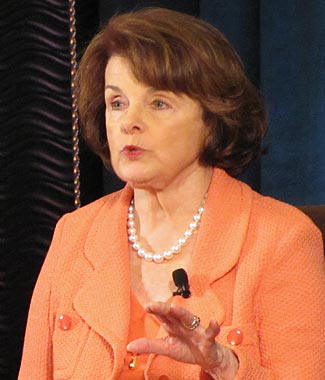 |
| “The question is, can we really bite the bullet and make the decision that we’re going to save the planet, because if it warms … 4 to 7 degrees, it’s too late.” ~ Senator Dianne Feinstein |
“But ever since the industrial revolution when we began to pump carbon dioxide through fuel into the atmosphere. The atmosphere is very limited, it’s maybe seven miles up, and that’s it. And it’s like a shell. And so every bit of this that’s pumped into the atmosphere stays, it doesn’t dissipate. So as we fill the atmosphere with pollutants, methane, carbon dioxide, other things, what happens is, it warms the earth. And it begins with, animal habitat disappears, it begins with the ocean beginning to rise, it begins with more violent hurricanes, tornadoes, funnel clouds in the pacific, where in my youth they never used to be, they are now, on occasion. And, lightning strikes, I remember one June where there were thousands of lightning strikes that started hundreds of small fires in California. When it rains the drops are bigger, the rains more violent. Drought is more prevalent. So I think, actually, what’s going to be the ultimate changer, is weather.”
“People see weather, they see hurricanes, they see the devastation, and so I think eventually, people are going to come around to support restrictions on carbon dioxide, maybe a fee on the use of carbon that goes in to replace our deficit, our debt. A twenty dollar fee I think is like 1.2 trillion in revenue over ten years. If you just take half that, it’s 600 billion. And it accomplishes something.”
Greg Dalton: “Is there much support for that in the Senate?”
Senator Feinstein: “I wouldn’t say there’s much, I would say this – people are coming to realize now. And we have a little caucus that meets and discusses, we’ve had I think three global warming bills up, they didn’t get, I mean they got thirty six or so votes, but, everything’s getting worse. The weather is getting worse, and the climate change is getting worse. 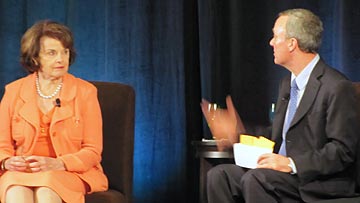 And actually since 2008, good energy has doubled, that’s the good thing. That you know electric cars are being more prevalent, hybrids are being more prevalent. People are saving money. So good things are happening, the question is, can we really bite the bullet and make the decision that we’re going to save the planet, because if it warms, and I heard your opening spot, 4 to 7 degrees, it’s too late. If we can confine this warming to one to two degrees, then, there’s big change, but it’s handle able. And that’s where we should strive to go. China in particular has a terrible, terrible problem. Deaths are now up from pollution. People are wearing masks virtually all winter long in Shanghai and Beijing.”
And actually since 2008, good energy has doubled, that’s the good thing. That you know electric cars are being more prevalent, hybrids are being more prevalent. People are saving money. So good things are happening, the question is, can we really bite the bullet and make the decision that we’re going to save the planet, because if it warms, and I heard your opening spot, 4 to 7 degrees, it’s too late. If we can confine this warming to one to two degrees, then, there’s big change, but it’s handle able. And that’s where we should strive to go. China in particular has a terrible, terrible problem. Deaths are now up from pollution. People are wearing masks virtually all winter long in Shanghai and Beijing.”
Greg Dalton: “And there’s been some recent reports putting price tags on all of that, the price of the health loss of life, etc. President Obama in his inaugural address and state of the Union pledged stronger action on climate. Do you think he’s doing enough? Specifically, what should he do?”
Senator Feinstein: “The President has so many things, and everybody says do you think he’s doing enough on this or that or the other thing, and he’s going to appoint a new EPA director. The EPA now has the ability to move ahead, so it’s very important that the EPA director be strong and be willing to take the action that’s necessary to help us all save this planet.”
Greg Dalton: “And you think Gina McCarthy will get confirmed?”
Senator Feinstein: “That’s a good question, everything is questioned these days. It’s the first time I have ever seen a president go through years of his presidency without being able to confirm members of his own cabinet.”
Greg Dalton: “And the judiciary?”
Senator Feinstein: “And the judiciary, well the judiciary is sort of a place apart. But for the executive branch to work, having your cabinet in place is a no brainer. You know, everybody says well elections matter, yes they matter. Whoever is president has to be able to govern and the way you govern is through your executives which are your cabinet secretaries.”

Greg Dalton: “Do you think the U.S. should approve the Keystone pipeline?”
Senator Feinstein: “I have just been reading a National Geographic article on tar sands, and everything I’ve seen in that article is bad. Now this tar sands project is up in Alberta. I’m told that the area is bigger than the state of Florida. I’m told that it’s a forested area which they mowed down and then began to dig the huge giant lakes, that they pour chemicals in to produce this form of tar sands oil. The earth is defaced forever. Now we have to make up our minds – do we want to deface large portions of our earth forever? I don’t think so, because we’re making progress on clean energy, and that ought to be where we go. And some people say well, you know, if that pipeline isn’t built north to south through the center of our country, they’re only going to do it east to west and send it to China. I think that is really not a very good argument because I think we really have to look at tar sands.”
Greg Dalton: “Another area of potential large oil development is here in California – the Monterey shale new fracking technologies making accessible about 15 billion barrels of oil which is equal to half the amount originally in the north slope of Alaska. Should that be developed and should California tax that? California is the only state that doesn’t tax oil extraction.”
Senator Feinstein: “Well I sure think we ought to tax it. Because I don’t think candidly that it’s all that necessary. There will be no drilling off the coast of California if Senator Boxer and I prevail, and we have so far. And the house delegation as well. The people of our state voted, and we voted against offshore oil drilling and I believe we ought to keep that vote. But my emphasis would be on clean energy, you know the wind farms, the solar facilities…and there’s so much research going on, on different forms of fuels. I’m amazed at what they think they can make fuel out of these days. So you know, I say, that’s just great, let’s do it. And leave these fossil fuels alone because they pollute the atmosphere.”
Water
“I spend a lot of my time on water in California. There is no question in my view that we are on our way to a much drier climate, we are on it because of global warming. We are on our way to the major source of water, which is the Sierra Nevada snow pack, drying up. And it’s very serious, and so there are big water fights. Right now the water allocation for south of Delta farmers I believe is 20% of their contract amount, that is way too little. A farmer can’t plant, irrigate and harvest with twenty percent of his contract amount. He probably can’t go to the banks and get the loans that he might need with twenty percent of his contract.”
National Security
 “If you have low lying areas, let’s take Bangladesh, let’s take some of the bigger islands, and they are flooded, where do people go, and what’s the result of that movement of people in low lying areas all over the world? What’s the result in oceans warming so that fishing stocks are killed or no longer as prevalent. So these are the kinds of national security concerns I think that emanate from that. And what was being done is having our satellites track various areas so that we could note changes over years- the melting arctic, the melting Antarctic. Greenland which is substantial melting, and from that you see the movement of people that’s gonna have to take place and then what happens with that. ”
“If you have low lying areas, let’s take Bangladesh, let’s take some of the bigger islands, and they are flooded, where do people go, and what’s the result of that movement of people in low lying areas all over the world? What’s the result in oceans warming so that fishing stocks are killed or no longer as prevalent. So these are the kinds of national security concerns I think that emanate from that. And what was being done is having our satellites track various areas so that we could note changes over years- the melting arctic, the melting Antarctic. Greenland which is substantial melting, and from that you see the movement of people that’s gonna have to take place and then what happens with that. ”
Greg Dalton: “And some people are very concerned about Indonesia, largest Muslim country, heavily dependent on fishing. If fishing starts to go down in Indonesia, what does that mean for stability…”
Senator Feinstein: “That’s what I tried to say, I wasn’t as eloquent as you were.”
Greg Dalton: “Last question is, how do you think climate change will affect you and your family in years ahead?”
Senator Feinstein: “Well, I have seven grandchildren, and I really believe it will affect them. And I really hate to say this, but I spent forty years in this life in government, and to end it and not have secured a world that’s capable of sustenance and beauty and wonder for my grandchildren, is just a crushing blow. So, I hope that within the next six years, you’re going to see a climate change bill pass in the Senate and the House and be signed by this President.”
Q (press conference): “What action can we expect on climate change?”
Senator Feinstein: “I think that’s hard to predict right now. I think it’s not on the high priority list. I think that a carbon fee is growing in popularity. It’s my intention – I know there’s been a bill introduced at twenty dollars a ton, and it’s my intention to introduce one at ten dollars a ton, and we’ll see what happens to it.”
Report by James George
Argo – Former President Jimmy Carter’s Oscar Wish Comes True
Monday, February 25th, 2013Feb 24, 2013, San Francisco
Former President Jimmy Carter appeared at a packed Herbst theater in San Francisco Sunday and spoke on several important issues including global health, human rights, and his critique of the use of drones. In response to an audience question, he said he hoped that the film Argo would win the Oscar for the best picture. Later that night, his wish came true and Argo won best picture at the academy awards.
Transciption
Question: “Mr. President, … before you came here, we were talking about your favorite for the Academy Awards best picture tonight, so there were a number of questions – let me try to roll them into one. There’s been a bit of controversy relating to the movie Argo over the role played by Canadian Ambassador Ken Taylor and his embassy staff versus that played by the CIA in shepherding six US diplomats to freedom during the ’79 hostage crisis. Can you shed some light on these events and are there any events that weren’t captured in the movie that you could share with us?”
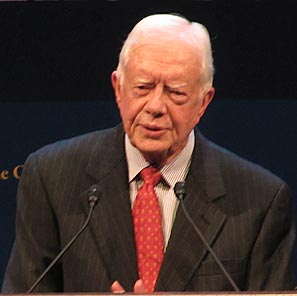 |
| “it’s a vivid wonderful film, not precisely factual, but I hope it gets the best picture award” ~ Former President Jimmy Carter |
President Carter: “Well, I was on the Piers Morgan show and he’s here in California to report on the Oscar presentations tonight and that’s why he concentrated on this particular issue. As a matter fact, I was president when the hostages were taken in Iran, as most of you old enough would remember, and I was informed immediately that six of our hostages were not taken in the compound by the Iranians. They escaped they went to two or three other places, and for instance the British and some others wouldn’t take them in, so they finally wound up in the Canadian embassy … were where they were taken in. And the Canadians were in great potential trouble that because all of their diplomats could also have been taken hostage if they had been caught protecting Americans. And so Ken Taylor was the ambassador there, and Flora MacDonald was the foreign minister for Canada. I was faced with a very difficult position too, because I wanted to keep it absolutely sacred, and I finally worked out at an agreement between the CIA and the Canadians that the American hostages would escape using Canadian passports. But you can imagine the difficulty, legally speaking, for the Canadian Parliament to issue false passports, so to the entire parliament had to go into secret session – the only time they’ve ever done that in history, and they did and they voted to issue the six false passports and they kept it secret, so the false passports went over there and the hostages were permitted to leave.”
“The movie role, played by the American hero – he was only there for a day and a half. Ken Taylor and them were there through the whole thing and so when the Americans escaped, contrary to the very vivid end in the movie that brought me to the edge of my seat as well when I watched it, where this pickup truck outran a jet airplane taking off – I’m not criticizing Hollywood – but nobody ever knew that the six Americans had been in the Canadian embassy until they were safe in Switzerland. And my wife and I were invited to go to Queens College in Canada last fall to receive unread doctorate degrees, which we did, and so I watched Argo before I went because I knew that Ken Taylor and Flora MacDonald were going to be in the audience. They had also seen the film, and my judgment is that 90% of the credit for that heroic and brilliant move should have been with the Canadians, and the movie ignores practically any contribution by the Canadians. But aside from that, it’s a vivid wonderful film, not precisely factual, but I hope it gets the best picture award.”
“And you said one other thing. One other thing that hasn’t ever been … On a different basis, we had CIA agents going into Iran fairly often, and one time we had four CIA agents went in, and there was a very close relationship between Iran and Germany. Most of the Iranian leaders were educated in Germany, so we ordinarily used German passports. So these four Americans were leaving Iran and went through customs, and as they went through, one of then showed him his passport and he said okay go ahead and he walked about 20 feet and the customs agent said wait come back. I’ve been a customs agent here for 20 years, and I have never before seen a German passport with the an initial on it, they always spell out the full names, and here your name here is Arrow H. Shifter. He said, I don’t understand it, so the CIA agent thought very rapidly, and he said, well I can have to confess, when I was born my parents gave me the middle name of Hitler, and I have special permission to use the initial, so he said go on through… that hasn’t been told publicly before by the way.”
Report by James George
Climate change, energy excerpts, Obama’s state of the union address
Wednesday, February 13th, 2013Today, no area holds more promise than our investments in American energy. After years of talking about it, we’re finally poised to control our own energy future. We produce more oil at home than we have in fifteen years. We have doubled the distance our cars will go on a gallon of gas, and the amount of renewable energy we generate from sources like wind and solar – with tens of thousands of good American jobs to show for it. We produce more natural gas than ever before – and nearly everyone’s energy bill is lower because of it. And over the last four years, our emissions of the dangerous carbon pollution that threatens our planet have actually fallen.
But for the sake of our children and our future, we must do more to combat climate change. Now, it’s true that no single event makes a trend. But the fact is the twelve hottest years on record have all come in the last fifteen. Heat waves, droughts, wildfires, floods – all are now more frequent and more intense. We can choose to believe that superstorm Sandy, and the most severe drought in decades, and the worst wildfires some states have ever seen were all just a freak coincidence. Or we can choose to believe in the overwhelming judgment of science – and act before it’s too late.
Now, the good news is we can make meaningful progress on this issue while driving strong economic growth. I urge this Congress to get together, pursue a bipartisan, market-based solution to climate change, like the one John McCain and Joe Lieberman worked on together a few years ago. But if Congress won’t act soon to protect future generations, I will. I will direct my Cabinet to come up with executive actions we can take, now and in the future, to reduce pollution, prepare our communities for the consequences of climate change, and speed the transition to more sustainable sources of energy.
Four years ago, other countries dominated the clean energy market and the jobs that came with it. And we’ve begun to change that. Last year, wind energy added nearly half of all new power capacity in America. So let’s generate even more. Solar energy gets cheaper by the year – let’s drive down costs even further. As long as countries like China keep going all in on clean energy, so must we.
Now, in the meantime, the natural gas boom has led to cleaner power and greater energy independence. We need to encourage that. And that’s why my administration will keep cutting red tape and speeding up new oil and gas permits. That’s got to be part of an all-of-the-above plan. But I also want to work with this Congress to encourage the research and technology that helps natural gas burn even cleaner and protects our air and our water.
In fact, much of our new-found energy is drawn from lands and waters that we, the public, own together. So tonight, I propose we use some of our oil and gas revenues to fund an Energy Security Trust that will drive new research and technology to shift our cars and trucks off oil for good. If a nonpartisan coalition of CEOs and retired generals and admirals can get behind this idea, then so can we. Let’s take their advice and free our families and businesses from the painful spikes in gas prices we’ve put up with for far too long.
I’m also issuing a new goal for America: Let’s cut in half the energy wasted by our homes and businesses over the next twenty years. We’ll work with the states to do it. Those states with the best ideas to create jobs and lower energy bills by constructing more efficient buildings will receive federal support to help make that happen.
America’s energy sector is just one part of an aging infrastructure badly in need of repair. Ask any CEO where they’d rather locate and hire – a country with deteriorating roads and bridges, or one with high-speed rail and Internet; high-tech schools, self-healing power grids. The CEO of Siemens America – a company that brought hundreds of new jobs to North Carolina – said that if we upgrade our infrastructure, they’ll bring even more jobs. And that’s the attitude of a lot of companies all around the world. And I know you want these job-creating projects in your district. I’ve seen all those ribbon-cuttings.
Video of Obama’s Climate Change Statements at Second Inaugeral Address
Tuesday, January 22nd, 2013“We, the people, still believe that our obligations as Americans are not just to ourselves, but to all posterity. We will respond to the threat of climate change, knowing that the failure to do so would betray our children and future generations. Some may still deny the overwhelming judgment of science, but none can avoid the devastating impact of raging fires, and crippling drought, and more powerful storms. The path towards sustainable energy sources will be long and sometimes difficult. But America cannot resist this transition; we must lead it. We cannot cede to other nations the technology that will power new jobs and new industries – we must claim its promise. That’s how we will maintain our economic vitality and our national treasure – our forests and waterways; our croplands and snow capped peaks. That is how we will preserve our planet, commanded to our care by God. That’s what will lend meaning to the creed our fathers once declared.”
transcription via Obama’s Second Inaugural Speech – NYTimes.com.
Obama’s Second Inaugural Speech – NYTimes.com
Monday, January 21st, 2013‘We, the people, still believe that our obligations as Americans are not just to ourselves, but to all posterity. We will respond to the threat of climate change, knowing that the failure to do so would betray our children and future generations. Some may still deny the overwhelming judgment of science, but none can avoid the devastating impact of raging fires, and crippling drought, and more powerful storms. The path towards sustainable energy sources will be long and sometimes difficult. But America cannot resist this transition; we must lead it. We cannot cede to other nations the technology that will power new jobs and new industries – we must claim its promise. That’s how we will maintain our economic vitality and our national treasure – our forests and waterways; our croplands and snow capped peaks. That is how we will preserve our planet, commanded to our care by God. That’s what will lend meaning to the creed our fathers once declared.’
Rick Santorum: ‘The dangers of carbon dioxide? Tell that to a plant’ | The Ticket – Yahoo! News
Tuesday, March 13th, 2012‘Rick Santorum told attendees at the Gulf Coast Energy Summit in Biloxi, Mississippi, on Monday to trust his judgment on the environment, highlighting his position on climate change—that is, that it’s a liberal myth.’
via Rick Santorum: ‘The dangers of carbon dioxide? Tell that to a plant’ | The Ticket – Yahoo! News.
Nuclear Chessboard. George Shultz, William Perry, & Sam Nunn’s Comments on Iran and Nuclear Weapons
Sunday, March 4th, 2012Feb 23, 2012. San Francisco.
George Shultz, Sam Nunn, William Perry spoke at a San Francisco Commonwealth Club event, “The Nuclear Chessboard, 2012“. These excerpts focus on Iran’s suspected nuclear weapons development program.
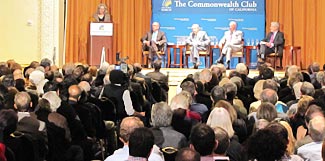 |
| The panel before a packed auditorium at the Mark Hopkins Hotel |
The three elder statesmen, featured in moderator Philip Taubman’s recent book “The Partnership: Five Cold Warriors and Their Quest to Ban the Bomb”, made comments mostly consistent with recent statements coming from the Obama administration, which boil down to a good-cop bad-cop strategy where international economic sanctions against Iran are promoted as a means to both stop Iran’s alleged nuclear weapons program and also stave off a dangerous Israeli military attack.
A few complicating issues were not addressed in the short time available: 1) Does the legacy of false W.M.D. claims that were used to justify the Iraq war weaken the credibility of United State as a broker in the Iran situation, possibly impacting cooperation from China and Russia? 2) What would the environmental consequences and political precedent be of an Israeli attack on Iran’s nuclear reactor and other nuclear facilities? Would radioactivity be released and how dangerous would this be to Iran and surrounding regions? 3) Does de facto acceptance of Israel’s nuclear arsenal weaken the U.S. case against Iranian nuclear weapons? 4) Could at attack on Iran bring about the very thing it would purport to avoid? Might nuclear weapons be used in an attempt to either destroy hardened targets, or as a punitive response if Iran responded unpredictably or against civilians outside of Iran?
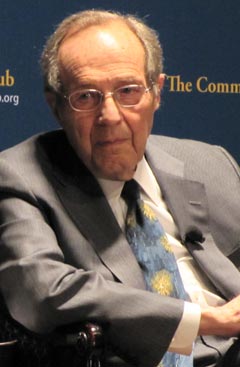 |
| “Our best chance of doing that is through what I would call coercive diplomacy. Diplomacy, but with a very heavy threat behind it.” ~William Perry |
Transcription:
William Perry, Former U.S Secretary of Defense: I believe that Iran has been moving seriously and energetically for the last ten to fifteen years to develop a nuclear weapon, I think that probably within a few years of achieving that goal. This in spite of the fact that they have consistently denied that they are doing that. I also believe that the government of Israel believes that a nuclear weapon in Iran poses an existential threat to their country, and is determined to prevent that from happening, possibly with a military strike. A military strike, even if successful, would have a whole host of unintended consequences, nearly all of them bad. So, I think our role in the United States is to try to provide reasons for Israel for not taking that strike, and the only reasons that hold up are that we are taking actions in concert with other nations in the world to stop Iran from getting a nuclear weapon.
Our best chance of doing that is through what I would call coercive diplomacy. Diplomacy, but with a very heavy threat behind it. I think the most effective threat against Iran is shutting down their financial transactions which indeed we are starting to doing in the last few months. I believe if we can continue that pressure and increase that pressure we could be successful in putting enough pressure on Iran to stop the program. The weakness of that today is that Russia is only partially cooperating and China not at all. And our diplomatic role that has to convince Russia and China that a military attack on Iran would have deleterious consequences not only for Iran and the United States and Israel, but for Russia and China also, and therefore to get behind this program to put real pressure on Iran.
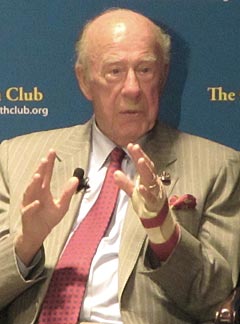 |
| “It seems to me we can’t allow Iran to sort of draw out a long diplomatic process which they simply use to gain time to develop their weapons” ~ George Shultz |
George Shultz, Former U.S Secretary of State: I subscribe to what Bill said completely. However, if we have a situation where sanctions are beginning to really work in Iran, and it looks to me as though they probably are, the financial pressures are great that is the real pressure point. It seems to me we can’t allow Iran to sort of draw out a long diplomatic process which they simply use to gain time to develop their weapons. So I think we’d have to move energetically, and I would say to them something like this, look, you say you’re developing your enrichment capacity for peaceful purposes. The volume of the enrichment that you’re doing far exceeds any domestic use you may have in a nuclear power plant. You’ve only got one plant. The Russians are supplying the fuel for it as it is. So if you mean it that this is for civilian purposes, you must be wanting to sell your enriched uranium on the international market, so we’ll help you do it.
And that means that you have to be part of some international nuclear fuel cycle regime that includes having knowledgeable people and quite a few of them in your plant so that we know exactly what’ s going on, that you’re not enriching to weapons grade. But this would have to be done rapidly, because people uses negotiations just as a stall, to gain time.
I might say that Senator Nunn and his organization have really done yeomen work in developing the nuclear fuel cycle idea and have had a lot to do with creating a fuel bank that can be used by countries so they don’t have to enrich uranium themselves, and I think there is the making an international regime here.
But if you’re going to wait and see what sanctions do, then I think you need to have some sort of a proposal, and I wouldn’t just sit and namby pamby around. I’d say okay, you say it’s for civilian purposes, I’m calling that card.
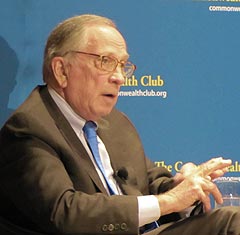 |
| “So this is not a raid like we’ve seen before on Iraq and Syria. It’s a big deal. It has a lot of consequences. We gotta think through it.” ~ Sam Nunn |
Former U.S. Senator Sam Nunn:
In the case of Iran I might just say, it’s a difficult scenario.
If they do get nuclear weapons they’re going to be several other countries in that part of the world that will get, in my view that will have a very active quest for nuclear weapons. If we have a conflict it has all sorts of implications. It would not be an over and out type of conflict. You’d have to take out their defensive missiles. If you were serious about it, you’d have to take out their nuclear sites and there’s certainly not one or two there are a lot more than that. Sidney Drell, our physicist partner that’s portrayed in this book [The Partnership: Five Cold Warriors and Their Quest to Ban the Bomb] reminded us yesterday afternoon, you need to take out the electrical grid also, would have huge implications to their nuclear program. Since they have threatened to close the Persian Gulf, you’d would really need to take out their navy and probably a lot of their air force.
So this is not a raid like we’ve seen before on Iraq and Syria. It’s a big deal. It has a lot of consequences. We gotta think through it. But I do believe there is some hope because the Iranians are in a real economic squeeze now. First of all they’ve got a bad economic system, and second, the embargoes are having some effect. The evaluation of their currency has gone down about 30% in the last six months. So they are feeling the pain. Unfortunately, a lot of innocent people suffer, and that is something you always are concerned about, but the alternatives are pretty grim. And if of course we had a war there would be even more suffering. So the embargo has got to be tightened, we’ve got to do everything we can to persuade China and Russia to participate in it. The Europeans are beginning to be very assertive, talking about cutting off the import of Iranian oil – all that may have an effect.
The only other.. if there’s anything regarding Iran these days that’s a bright spot, is a dark bright spot. I would say the one dark bright spot here is that they contend over and over again – though we don’t believe them and shouldn’t believe them – that they don’t have a weapon program and they’re not going to have a weapon program, and their Ayatollah just said it would be a sin to develop weapons. Now do I believe that, no, but do I think that is important yes, because it is a face saving place to come down, if we can come up with a concept like George talked about, with some type of international enrichment centers, that are under 24 by 7 IAEA camera and control. So, that’s the dark bright spot in a very difficult situation.
Report by James George
Indigenous Peoples Condemn Climate Talks Fiasco and Demand Moratoria on REDD+
Tuesday, December 13th, 2011‘…Tom Goldtooth, Director of Indigenous Environmental Network based in Minnesota, USA does not mince words. “By refusing to take immediate binding action to reduce the concentration of greenhouse gas emissions, industrialized countries like the United States and Canada are essentially incinerating Africa and drowning the small island states of the Pacific. The sea ice of the Inupiat, Yupik and Inuit of the Arctic is melting right before their eyes, creating a forced choice to adapt or perish. This constitutes climate racism, ecocide and genocide of an unprecedented scale.”‘
via Indigenous Peoples Condemn Climate Talks Fiasco and Demand Moratoria on REDD+.



























































